Erstellt am: 24. 9. 2012 - 11:19 Uhr
The Shadows of the Energiewende
On a wide of bed of gravel and rocks, just below the village of Prägraten, the Isel river splits into three shallow, fast-moving channels. Here, stones have been piled on top of each other to form pyramid figures that look like grey snowmen. They are called “Iselmander” and they`ve been built by opponents of a controversial hydroelectric project.
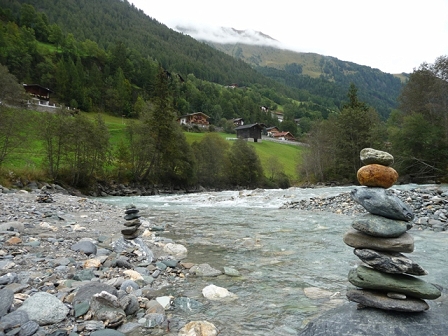
chris cummins
One of these opponents is 26-year old Regina Köll. She calls the stone figures "guardians" and says they should remind people about the importance of protecting the fragile nature of the valley: "They are sign posts to our intact glacial river, which we have to protect."
The hydroelectric project's proponents dismantle the "Mander" as soon as the opponents have built them. They were convinced by the arguments presented by the mayors of Prägraten and nearby Virgen, who have promised that the project will bring welcome revenue into a cash-strapped community, where there are few ski lifts and little industry.
"We need that money to reinvest in our local infrastructure", says local Karl Steiner. "We need to bring some life back into the valley."
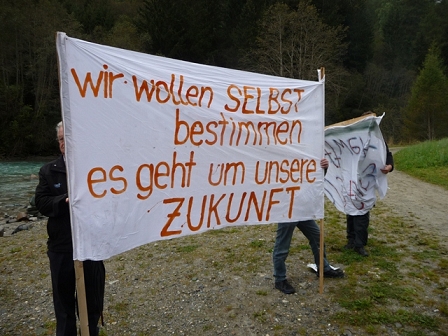
chris cummins
The plans for a hydroelectric plant on the Upper Isel are already well advanced. The building is scheduled to begin in 2014 and the power plant should start generating renewable electricity by the end of 2017. Virgen`s mayor Dietmar Ruggenthaler is surprised at the objections of the environmentalists. As well as providing a source of revenue for his community, he sees the power plant as a weapon against the overwhelming environmental threat facing the world right now - climate change. He describes the power station, which planners predict will provide 130 Gigawatt hours of electricity annually, as a "green battery".
Virgen recently won a European Energy Award. Many of the houses that line the main road through the valley have solar panels on their roofs and Ruggenthaler passes me a glossy brochure celebrating Virgen`s official appointment as a "climate protection community" in 2009. It features gushing praise from the Austrian environment minister Nikolaus Berlakovich who is quoted as saying "Virgen shows how it can be done".
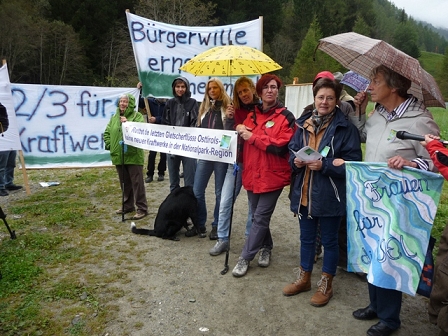
chris cummins
Yet Bernhard Köhler of the WWF fears the project will destroy what he describes as "one of the most beautiful valleys in East Tyrol". The Isel flows for 60 kilometers without interruption from its glacial source to its confluence in the Drava river. "That's absolutely unique in the Eastern Alps", says Köhler. The conservationist recognizes that Europe needs more renewable energy sources and insists, that he is not against hydroelectric power in principle, but he points out that since there are already an estimated 3,800 hydroelectric power plants of varying sizes in Austria, "this country has already contributed a great deal". According to the WWF, 70% of Austria's rivers have been already harnessed for electrical power production.
"Rivers are not just there for producing energy; they are also there as a haven for biodiversity", says Köhler.
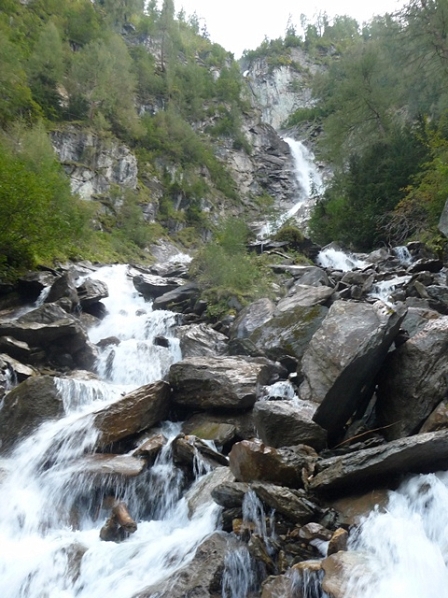
chris cummins
Ruggenthaler and the mayor of Prägraten, Anton Steiner, insist that every effort has been made to make sure the natural environment is protected. Wolfgang Widmann of INFRA, the company that is developing the project, insists that he Isel will remain "a free-flowing glacial river." It is a question of semantics; the WWF says the power of the river will be so dramatically reduced that gravel will no longer be transported down the valley, impacting the habitats of birds like the common sandpiper, as well as fish, such as grayling, insects and vegetation, particularly threatening the German tamarisk shrubs that are seen as markers of the river’s health.
Besides, says conservationist Wolfgang Retter, from the East Tyrol Water Network, Ruggenthaler is exaggerating the potential of the proposed hydroelectric plant. As a natural glacial river, he points out, the Isel's flow is minimal during the cold months: "In winter, when we need the most energy, it will hardly produce any electricity at all." He thinks that the community would boost its eco credentials more effectively by investing in photovoltaic and wind energy.
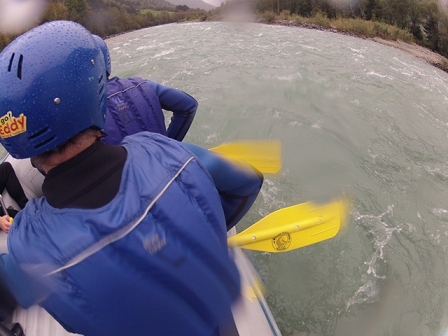
chris cummins
Further downstream the Isel is a mecca for white water rafting and kayaking. Some locals have voiced concerns that this lucrative business might be negatively impacted by powerstation because such water sports would suffer if the depth and flow of water is reduced. The project planners insist, however, that there will be no adverse effects.
The proponents of the project celebrated a major victory this June when a referendum was held in the two communities and two-thirds of the population voted in favour of the plant. Many supporters of the project are now angry that this democratic procedure didn't end the protest movement, which some suspect has been orchestrated from afar. They hold up a banner reading "We want to decide our own future!" Local baker Fritz Joss tells me that life is hard in the valley and it is unfair that people "with well-paid and secure jobs come here and tell us what to do."
But Regina Köll, who is joined at the riverside by a dozen other opponents of the project, mostly women, says that the opposition is very much home-grown. Her family runs a mountain hut in the valley and she feels that the plans to use the power plant revenue to boost tourism infrastructure such as lifts and swimming pools are misguided. She argues that it is the pristine nature that brings the tourists to East Tyrol rather than to the more built up regions of Austria, so protecting the unspoiled character of the countryside is absolutely key to the valley’s economic survival.
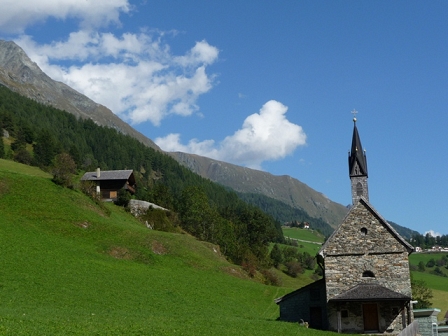
chris cummins osttirol
Another opponent of the project, Adolf Berger, a local farmer who also runs an agritourism bed and breakfast, agrees. He's skeptical of the authorities' climate saving rhetoric: "The power plant may well be good for the climate, but until we learn to use electricity more sparingly, it is not worth sacrificing the Isel for our energy excesses."
Regina Köll is undeterred by the defeat at the referendum. She says the phrasing of the question was too general and could have meant anything. She says the population was bamboozled by a professional pro-power station PR campaign and that the issue was never properly discussed.
She says it is difficult opposing the project in a community where everyone knows everyone: "It's a different mentality around here. People are not used to it, when someone stands up and voices their opinion, particularly not if you are a woman and even less so when you are a young woman. But that doesn’t matter. We`ll keep up the fight."


